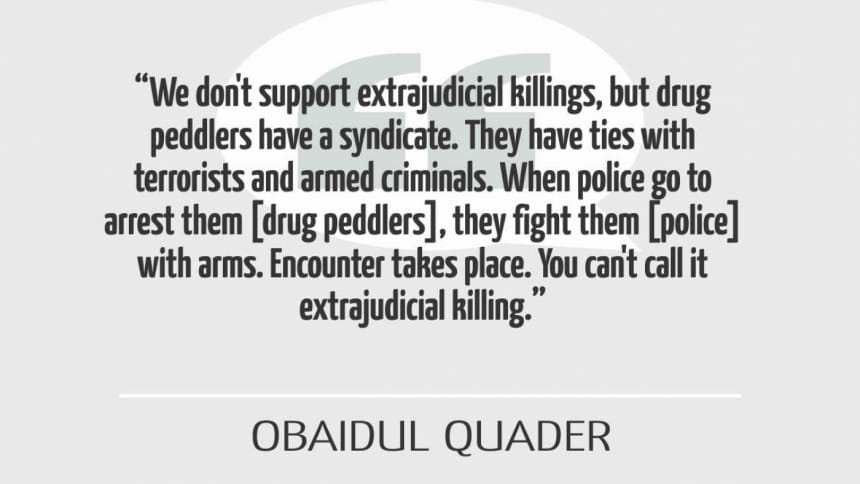Still available

Narcotics trade continues in at least three known spots in the capital with drug dealers changing their tactics in the face of the ongoing nationwide anti-drugs crackdown.
The drive, however, has had a mixed impact on the illicit trade in different parts of the country as drug peddlers have become alert and changed their sale and delivery spots.
In the capital, this newspaper talked to a number of drug users who said they were still getting narcotics from the known spots.
“If you want it [drugs], you will get it,” said a graduate of a public university who frequents four drug spots in the capital.
“The supply is still aplenty and the price remains unchanged. The retail price of a yaba pill is Tk 250. But if you buy five to six pills together, you can get them for Tk 200 each,” said the 26-year-old who has been taking the pink pills for five years.
He said he bought yaba pills on Monday from Mohammadpur's Geneva Camp, a drug hub popular among the addicts.
On May 4, Rab launched its own anti-narcotics operations while the police headquarters on May 16 instructed all police units across the country to conduct a special 10-day drive from May 18, according to Rab and police officials.
A reporter of The Daily Star visited the Geneva Camp, also known as Bihari Camp, for the last four days.
Narcotics were sold there openly till yesterday, but the number of peddlers and customers dropped significantly since an anti-drugs drive on Tuesday.
During a visit to the camp yesterday evening, this reporter saw seven to eight peddlers loitering near several shops, including Ashraf General Store, Imran Electronics and Ma Jewellers. A number of Yaba users, known to them as customers, bought the pink pills from them.
Seeking anonymity, one of the peddlers said they stopped selling narcotics openly as police have scaled up surveillance in the area.
“We now sell drugs only to trusted customers,” he added.
The picture was different on Monday. Around several hundred yards from the main entrance to the camp, about 15 peddlers were seen loitering on a lane with yaba pills in their hands around 1:00pm.
Three to four rickshaw-pullers were seen buying the pink tablets from them, keeping their rickshaws nearby.
One of the peddlers said, “The price is Tk 190. Don't bargain please.”
A rickshaw-puller then bought some pills and got out of the camp.
As our reporter approached the rickshaw-puller, he refused to talk.
Mistaking the reporter for a policeman, the rickshaw-puller said, “Please forgive me, sir. I am very poor. Please don't take me away.”
As the reporter gave his identity, the rickshaw-puller immediately left the spot.
He was one of the rickshaw-pullers who consume the pink pills and also sell those to other users, a number of camp dwellers later told the correspondent.
In the evening, drugs sale at the spot gained pace as the number of both drug peddlers and consumers rose.
But the situation changed the following day as the narcotics department with the help of police conducted a drive in the camp.
Three peddlers were picked up from there. Police were seen frisking people inside the camp before iftar.
But the peddlers became active again in the evening after the drive ended.
This time, they were alert and were selling the pink pills only to trusted customers.
A number of customers were seen approaching the peddlers who hid the pills inside mobile phones or tiny boxes.
The alarming thing was that they were using children to deliver the pills to customers, found this reporter.
Several drug addicts said they still got the pink pills from their sources, contacting them over the phone. But the prices were a bit higher than those sold on the spot.
Kabir, a university graduate who has been buying yaba from Geneva Camp for over five years, believes this crackdown would not be able to stop yaba trade.
Shoukat Ali, general secretary of Stranded Pakistanis General Repatriation Committee, told this newspaper, “More than 40,000 people living in the camp are held hostage to a racket of drug dealers. They are powerful. We welcome the move of the law enforcement agencies.”
Several leaders of the platform said a drug racket of 30 run the illegal trade in the camp and maintain close ties with law enforcement agencies and political parties.
The Daily Star could not independently verify their claims.
They also said several hundred youths and teenagers in the camp abuse drugs.
“If anyone from the camp helps catch a drug dealer, the person is targeted and harassed ... People here are scared to say anything against them [drug dealers],” said another leader of the platform, seeking anonymity.
Apart from Bihari Camp, narcotics were available in two known spots in Nilkhet and Chankharpool areas.
Jamil Hasan, a 24-year-old yaba addict, said yaba pills were still sold in the two areas.
“On a narrow lane close to Nilkhet book market, you will spot some child ragpickers who sell the pink pills openly,” he said.
In Chankharpool area, the dealers deliver drugs to users upon requests over the phone, added Jamil.
Narcotics were also available in some other parts of the city.
This reporter visited Karwan Bazar railway slum on Tuesday evening, and saw a few peddlers loitering along the railway lines. They were calling potential customers in low voices.
Several residents at Sweeper Colony in Old Dhaka told this reporter on Wednesday that a few peddlers sell cannabis at a known spot in Gonok Tuli area in the evening. But they were unsure whether yaba pills were also available there.
Asked, Mukul Jyoti Chakma, deputy director (Dhaka Metro) of the Department of Narcotics Control, told this newspaper that they have prepared a list of 37 top drug dealers who control the narcotics trade in the capital.
“We have information about their establishments and wealth. We will take action accordingly,” Mukul said on Tuesday after a raid in Bihari Camp.
Biplob Kumar Sarker, deputy commissioner of Dhaka Metropolitan Police (Tejgaon division) told this newspaper last night that they have been conducting drives in the camp regularly and picking up those found in possession of narcotics.
When informed that narcotics trade was still going on inside the camp, the DC said, “As the place is densely populated, it is tough to search every nook and cranny.
“However, we will keep raiding the spots on the basis of intelligence,” he mentioned.
About the top drug dealers in Bihari Camp, Biplob said it is hard to catch the “big fish” as they don't live in the camp.
Meanwhile, Home Minister Asaduzzaman Khan vowed to rid Dhaka city of the narcotics menace at any cost.
“Drug peddlers have no place in Dhaka city,” he said during an awareness campaign against narcotics in the Farmgate area yesterday.
“We have drawn up a list of drug dealers based on intelligence agencies' information. They will be brought to book one after another,” he said, adding that the drug dealers have to pay for their misdeeds.
DMP Commissioner Asaduzzaman Mia said, “Anti-narcotics crackdown is underway. We will bust all the drug dens in this city”.
In the neighbouring districts of Gazipur and Narayanganj, peddlers were found inactive at the known spots as they delivered drugs to consumers at “safer” places.
The picture was almost the same in Savar as well.
In Chittagong, two alleged drug dealers were killed in a "shootout”, but narcotics trade went unabated in the city.
Locals said that fearing "shootout", the top drug dealers went into hiding, but their accomplices were carrying on the illegal trade.
In a joint drive in Barisal Colony area in the port city, police, Chittagong district administration and Bangladesh Railway recently demolished around 30 shanties that were set up for running narcotics trade.
Our Sylhet correspondent reports that the main drug spots in the city remained untouched.
Sylhet Railway Gate and Sweeper Colony were still hotspots for retail trade of yaba, cannabis and other drugs.
Many of the drug dealers changed the spots for the illegal trade as some low-profile peddlers were arrested in recent drives by law enforcers in the city.
The addicts avoided the known spots, instead they phoned the dealers to deliver the narcotics at “safer” places. But they had to pay prices a bit higher than usual.
Our Rajshahi correspondent also gave a similar account of narcotics trade in the city.
In Nilphamari, the drug traders became very alert as they shifted their delivery spots to rural areas, and deals were done on mobile phones, using code words.
Our Chapainawabganj correspondent depicted the same picture in the town.
Most of the drug peddlers in Jhenidah town went into hiding in the face of the anti-narcotics crackdown.
Our Bogra correspondent also gave a similar version.
Drug peddlers in Brahmanbaria changed their tactics. They stopped selling narcotics in the known spots and chose “safer” places to deliver drugs to addicts. They were also providing home-delivery service.

 For all latest news, follow The Daily Star's Google News channel.
For all latest news, follow The Daily Star's Google News channel. 








Comments